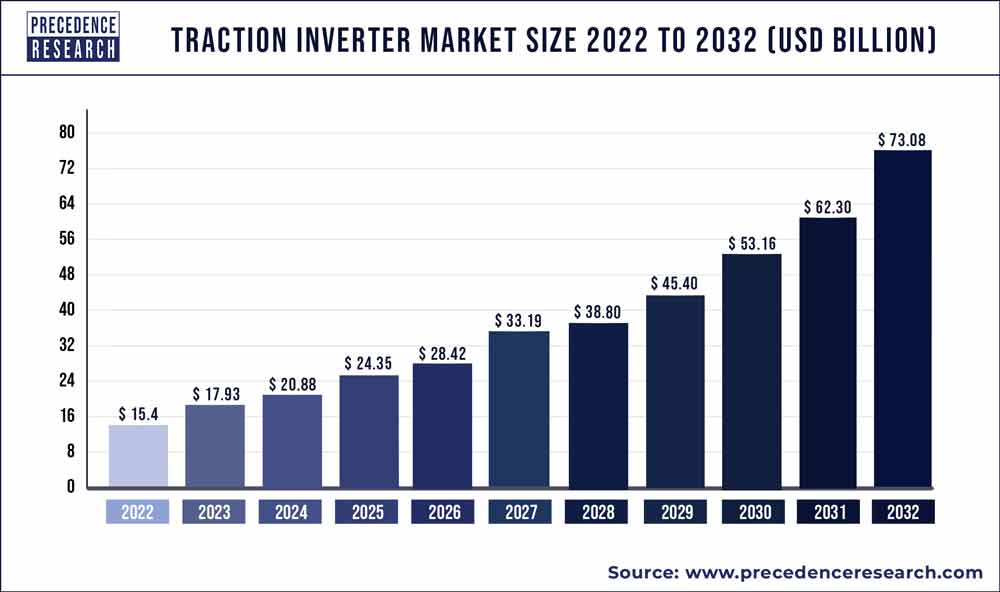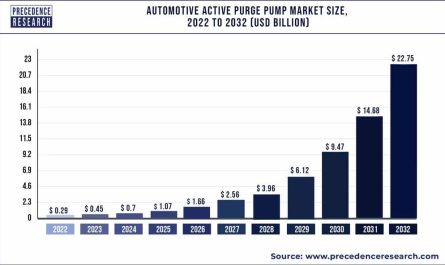The global traction inverter market size reached USD 17.93 billion in 2023 and is expected to reach around USD 73.08 billion by 2032, with a remarkable CAGR of 16.90% during the forecast period from 2023 to 2032.
Key Points
- North America contributed more than 44% of revenue share in 2022.
- Asia-Pacific is estimated to expand the fastest CAGR between 2023 and 2032.
- By propulsion, the BEV segment has held the largest market share of 44% in 2022.
- By propulsion, the PHEV segment is anticipated to grow at a remarkable CAGR of 17.2% between 2023 and 2032.
- By voltage, the 200 to 900V segment generated over 38% of revenue share in 2022.
- By voltage, the 900V and above segment is expected to expand at the fastest CAGR over the projected period.
- By technology, the MOSFET segment generated over 46% of revenue share in 2022.
- By technology, the IGBT segment is expected to expand at the fastest CAGR over the projected period.
- By vehicle, the commercial Vehicles segment generated over 42% of revenue share in 2022.
- By vehicle, the passenger cars segment is expected to expand at the fastest CAGR over the projected period.

The traction inverter market is experiencing robust growth globally, driven primarily by the increasing demand for electric vehicles (EVs) and hybrid vehicles. Traction inverters are critical components in electric drivetrains, converting DC power from the battery into AC power to drive the vehicle’s electric motor. As the automotive industry transitions towards electrification to reduce emissions and meet stringent regulatory standards, the demand for traction inverters is expected to surge significantly.
Get a Sample: https://www.precedenceresearch.com/sample/3579
Growth Factors:
Several factors contribute to the growth of the traction inverter market. The growing awareness of environmental sustainability and the need to reduce greenhouse gas emissions are encouraging automakers to invest heavily in electric and hybrid vehicle technologies. Additionally, advancements in power electronics and semiconductor technology have led to the development of more efficient and compact traction inverters, further driving market growth. Moreover, government initiatives and incentives aimed at promoting electric vehicle adoption are also fueling market expansion.
Region Insights:
The traction inverter market exhibits strong growth across various regions, with Asia Pacific emerging as a key market leader. Countries like China, Japan, and South Korea are at the forefront of electric vehicle production, driving significant demand for traction inverters. Europe and North America also represent substantial market shares, driven by the increasing adoption of electric vehicles and supportive government policies promoting clean transportation.
Traction Inverter Market Scope
| Report Coverage | Details |
| Growth Rate from 2023 to 2032 | CAGR of 16.90% |
| Market Size in 2023 | USD 17.93 Billion |
| Market Size by 2032 | USD 73.08 Billion |
| Largest Market | North America |
| Base Year | 2022 |
| Forecast Period | 2023 to 2032 |
| Segments Covered | By Propulsion, By Voltage, By Technology, and By Vehicle |
| Regions Covered | North America, Europe, Asia-Pacific, Latin America, and Middle East & Africa |
Traction Inverter Market Dynamics
Drivers:
Several key drivers are propelling the traction inverter market forward. The ongoing shift towards electric mobility, coupled with stringent emission regulations, is a primary driver, spurring the demand for traction inverters. Furthermore, advancements in battery technology, coupled with declining costs of lithium-ion batteries, are making electric vehicles more affordable and attractive to consumers, thereby boosting the demand for traction inverters.
Opportunities:
The traction inverter market presents lucrative opportunities for market players to innovate and expand their product offerings. With the growing adoption of electric vehicles in commercial applications such as buses and trucks, there is a rising demand for high-power traction inverters capable of meeting the requirements of heavy-duty vehicles. Additionally, the integration of advanced features such as bidirectional power flow capability for vehicle-to-grid applications presents untapped opportunities for market growth.
Challenges:
Despite the promising growth prospects, the traction inverter market faces certain challenges. One of the primary challenges is the high initial investment required for research, development, and manufacturing of traction inverter systems. Additionally, the complexity of integrating traction inverters into electric vehicle drivetrains and ensuring compatibility with different vehicle architectures pose technical challenges for manufacturers. Moreover, supply chain disruptions and shortages of critical components, such as semiconductors, can also impact market growth and hinder the timely delivery of traction inverter systems to customers.
Read Also: Automotive Seat Belts Market Size To Attain USD 25.49 Bn By 2032
Recent Developments
- In July 2022, Curtiss-Wright expanded its industrial division, introducing a new lineup of products within the traction inverter sector. This expansion notably includes traction inverters designed for both hybrid and pure-electric on-highway and off-highway commercial vehicles. The focus on efficiency and innovation underscores Curtiss-Wright’s commitment to advancing electric mobility solutions. By diversifying its product portfolio in the traction inverter market, Curtiss-Wright aims to cater to the growing demand for advanced electric propulsion systems in the commercial vehicle sector, aligning with the global trend toward sustainable and eco-friendly transportation.
- In June 2022, STMicroelectronics (ST) and Semikron joined forces to create a Silicon Carbide (SiC)-powered semiconductor, specifically designed for electric vehicle traction drives. This collaborative effort signifies a strategic move to propel advancements in automotive traction inverter technologies. Silicon Carbide, known for its superior performance in power electronics, is expected to enhance the efficiency and capabilities of traction inverters in electric vehicles. By leveraging the expertise of both STMicroelectronics and Semikron, this collaboration aims to contribute to the evolution of cutting-edge solutions, supporting the automotive industry’s shift towards more efficient and sustainable electric propulsion systems.
Traction Inverter Market Players
- Siemens AG
- Infineon Technologies AG
- Continental AG
- Robert Bosch GmbH
- Delphi Technologies
- Hitachi Automotive Systems
- Mitsubishi Electric Corporation
- Toshiba Corporation
- Fuji Electric Co., Ltd.
- ABB Ltd
- Dana Incorporated
- Lear Corporation
- Texas Instruments Incorporated
- STMicroelectronics
- ON Semiconductor
Segments Covered in the Report
By Propulsion
- BEV
- HEV
- PHEV
- Others
By Voltage
- Up to 200V
- 200 to 900V
- 900V and above
By Technology
- IGBT
- MOSFET
- Others
By Vehicle
- Passenger Cars
- Commercial Vehicles
- Others
By Geography
- North America
- Europe
- Asia-Pacific
- Latin America
- Middle East and Africa
Contact Us:
Mr. Alex
Sales Manager
Call: +1 9197 992 333
Email: sales@precedenceresearch.com
Web: https://www.precedenceresearch.com
Blog: https://www.expresswebwire.com/
Blog: https://www.uswebwire.com/

